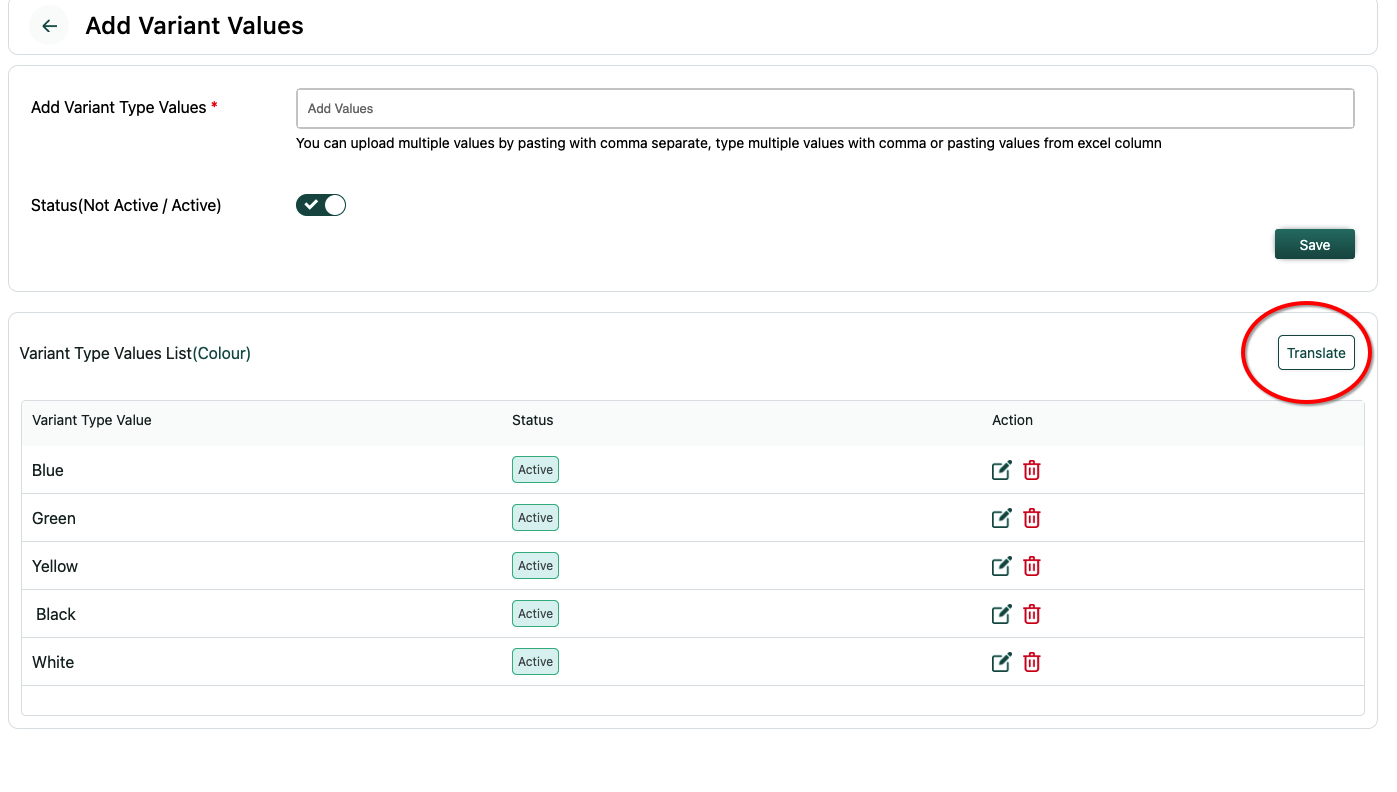Listing Variants
Variants, also known as child listings, are sub-sets of a main listing that share the same attributes but have different pricing and inventory/stock limits. This allows users to offer a range of options for a single listing, such as different sizes, colors, or quantities.
Tradly allows for an unlimited number of variant types and allows users to add multiple variants under a single listing. We use a matrix approach for managing variants, which means that the available unit or price for a listing can be changed based on each combination of selections.
How to Configure Variants Setup?
Before you are able to use Variants in Add Listing page(form, screen), you need to configure them in SuperAdmin.





Example: Product Shop
if you are selling t-shirts and you want to offer three different sizes (S, M, and L) and two different colors (red and blue), you would create six variants for your t-shirt listing:
- Small red t-shirt
- Small blue t-shirt
- Medium red t-shirt
- Medium blue t-shirt
- Large red t-shirt
- Large blue t-shirt
Each variant would have its own pricing and inventory/stock limit, allowing you to offer a range of options to your customers while still keeping track of your inventory.
In summary, listing variants allow users to offer multiple options for a single listing, such as different sizes, colors, or quantities, while still maintaining separate pricing and inventory/stock limits for each variant.
Example: Booking Platform
Examples of Variants in a Class/Tutoring Booking Platform
Class Packages
- Package A: 4 sessions for $100
- Package B: 8 sessions for $180
- Package C: 12 sessions for $240 In this example, you need to create a variant type called Package. And configure values such as Package A, Package B, Package C. Hence when a user create a listing, they will find this options to choose. From the listing page, they can add more details like description, etc.
Locations
- Location A: Online via Zoom
- Location B: In-person at tutor’s office
- Location C: In-person at student’s location
Same as above, after you configured in SuperAdmin, Location will be available in Add Listing form.
Times
- Time A: Monday and Wednesday at 5pm
- Time B: Tuesday and Thursday at 6pm
- Time C: Saturday at 10am
Using variants, a tutor can create separate listings for each combination of packages, locations, and times, allowing students to easily choose the class option that best fits their needs. For example, a student could select Package B with Location A and Time A to book 8 online sessions on Monday and Wednesday at 5pm.
In Crowdfunding
Example 1
Imagine a campaign owner is running a crowdfunding campaign to raise funds for a new eco-friendly product they are developing. They want to offer different rewards or perks to donors based on the amount of money they contribute.
In this case, the campaign owner could create a single listing for the crowdfunding campaign, and then create several variants to represent the different reward tiers. For example:
- A $50 variant could include a thank-you card and a small discount on the finished product
- A $100 variant could include a t-shirt with the campaign logo and a medium discount on the finished product
- A $250 variant could include a prototype of the finished product and a large discount on the finished product
- In this way, the campaign owner can easily manage the different reward tiers and track the inventory of each variant (e.g. how many t-shirts are left to fulfill the $100 reward tier). Donors can easily select the reward tier they want when making their contribution, and the campaign owner can track which variants are most popular and adjust their campaign strategy accordingly.
Example 2
Imagine that a campaign owner is running a crowdfunding campaign to fund the production of a new product. The product comes in three different colors (red, blue, and green) and two different sizes (small and large).
To allow backers to select the color and size of their choice, the campaign owner can create variants for each combination of color and size. For example, one variant could be “Red Small” with a price of $50, while another variant could be “Green Large” with a price of $60.
This way, backers can choose the specific combination of color and size that they want, and the campaign owner can track the inventory and pricing for each variant separately.
Additionally, the campaign owner can set different perks or rewards for each variant, such as offering a discount for backers who select the “Blue Small” variant or including an extra accessory for backers who choose the “Green Large” variant.
Overall, variants are a powerful tool for managing multiple options within a single crowdfunding campaign and allowing backers to customize their contributions
Example 3
Imagine that a campaign owner is running a crowdfunding campaign to raise money for a new product they are developing. They have created a listing for the product and want to offer several different reward options for donors who contribute to the campaign. These reward options could include different quantities of the product, as well as different levels of perks or exclusives.
To accomplish this, the campaign owner could create multiple variants for their listing, with each variant representing a different reward option. For example, one variant could offer one unit of the product at a certain price point, while another variant could offer three units of the product at a higher price point. The campaign owner could also create variants that offer perks such as exclusive access to beta testing, special edition packaging, or early bird discounts.
Using variants in this way allows the campaign owner to offer a variety of reward options to donors, while still keeping everything organized and easy to manage through a single listing. It also allows donors to easily select the reward option that best fits their needs and budget.